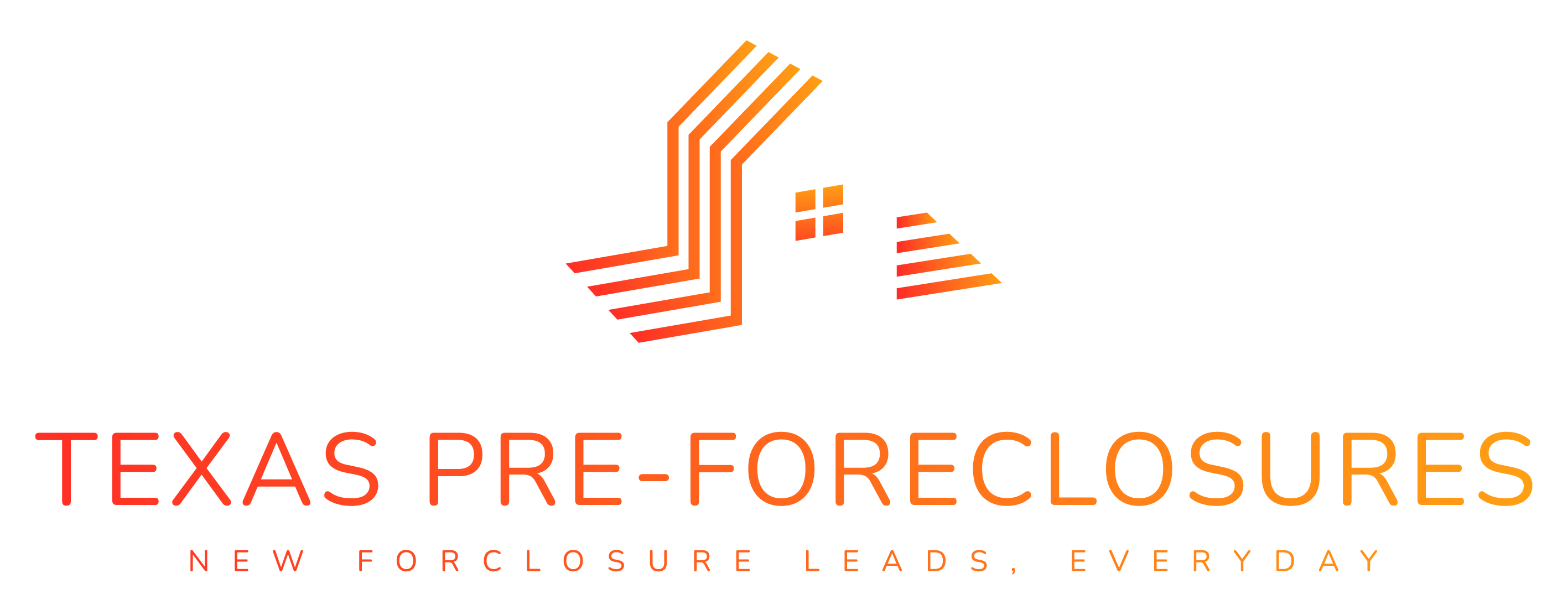Pre-Foreclosure vs. Tax Sale: Which is the Better Investment in Texas?
Pre-Foreclosure vs. Tax Sale: Which is the Better Investment in Texas?
Texas real estate investors often seek ways to find properties below market value. Two avenues that offer this potential are pre-foreclosures and tax sales. Both can lead to lucrative deals, but they carry distinct risks, rewards, and require different investment strategies.
Let’s break down these two types of distressed properties to understand which might be the better fit for your investment portfolio.
Understanding Pre-Foreclosures in Texas…
What is a Pre-Foreclosure? A property enters the pre-foreclosure stage when the homeowner defaults on their mortgage payments. The lender initiates the foreclosure process, but the property has not yet been repossessed and auctioned off.
The Pre-Foreclosure Process: In Texas, the pre-foreclosure process follows a specific timeline with key steps:
1) Notice of Default: The lender sends the homeowner a notice of default after a period of missed payments
2) Notice of Sale: At least 21 days before the scheduled foreclosure auction, a Notice of Sale is posted publicly (usually at the county courthouse) and sent to the borrower.
3) Foreclosure Auction: On the first Tuesday of the month, the property is auctioned to the highest bidder.
Pre-Foreclosures: Opportunities for Investors

-
Short Sales: When a homeowner falls behind on their mortgage payments, they may work with their lender to sell the property for less than what is owed. This helps them avoid foreclosure and the associated damage to their credit score. Investors who identify motivated sellers and can negotiate a favorable purchase price can find significant deals.
-
Direct Purchase: In some cases, investors might be able to bypass the lender and negotiate a purchase directly with the distressed homeowner. This can be particularly attractive if the homeowner is eager to avoid a drawn-out foreclosure process and is willing to accept a lower price for a faster sale.
-
Foreclosure Auction: Investors can participate in the public foreclosure auction for a chance to acquire the property. While competition can be fierce, particularly for desirable properties, there’s the potential to secure a property well below market value, especially if other bidders are hesitant.
Tax Sales: Opportunities for Investors
Tax sales offer the potential for even deeper discounts compared to pre-foreclosures. However, the path to ownership is more complex and comes with greater risks. Here’s what can make tax sales attractive for some investors:
-
Deep Discounts: Tax sale properties often start with minimum bids that only reflect the outstanding taxes, penalties, and interest owed. This can translate into significant savings compared to market value, especially if the redemption period expires and the investor acquires full ownership.
-
Portfolio Building: Tax sales can be a good way to build a portfolio of investment properties, particularly for those comfortable with a longer investment horizon. Acquiring multiple properties, even at a discount, can offer diversification and the potential for higher overall returns.
-
Cash Flow Potential: Once you gain full ownership of the property after the redemption period expires, you can rent it out and generate a steady stream of rental income. If you’ve acquired the property at a significant discount, the potential for cash flow can be very attractive.
Unveiling Texas Tax Sales
-
What is a Tax Sale? Property taxes are the lifeblood of local governments. When homeowners in Texas become delinquent on their property taxes for an extended period, the taxing authority can initiate foreclosure proceedings. The final step is a tax sale auction where the property’s tax lien is sold to the highest bidder.
-
Tax Sale Process: Tax sales generally involve a competitive public auction. The minimum bid often starts at the amount of outstanding taxes, penalties, and interest.
-
Important Note: The buyer at a tax sale doesn’t initially gain ownership. Instead, they purchase the right to collect the delinquent taxes. If the original owner redeems within the redemption period, the sale is nullified. Only if redemption doesn’t occur could the investor potentially take full ownership of the property.
Pre-Foreclosure vs. Tax Sale: Key Differences
| Feature: | Pre-Foreclosure: | Tax Sale: |
| Nature of Sale | Selling the actual property |
Selling a tax lien on the property
|
| Risk Level | Potentially lower | Generally higher |
| Timeline to Potential Ownership | Weeks to months |
Can be several months to years
|
| Competition | Varies | Often intense |
| Potential for Negotiation | Can negotiate with the homeowner |
Limited or no negotiation
|
| Property Condition | May be well-maintained |
Varies widely, potential for unseen damage
|
Which is Better: Pre-Foreclosure or Tax Sale?

The ongoing debate between pre-foreclosure and tax sale investing ultimately comes down to your individual goals, willingness to accept risk, and the resources at your disposal. Let’s breakdown the pros and cons of each approach to help you make an informed decision:
Pre-Foreclosures: Potential Advantages and Considerations
-
Faster Path to Ownership: Success with pre-foreclosures, whether through a short sale or winning a foreclosure auction, can often translate into property ownership within a relatively short timeframe (weeks to several months). This offers a faster potential return on investment.
-
Greater Control: In pre-foreclosure situations, investors may have more control over the process, including the opportunity to negotiate directly with the homeowner and potentially influence the purchase price.
-
Less Uncertain Condition: Since the homeowner may still reside in the property, there’s a greater chance of evaluating its condition prior to purchase. This helps avoid the potential surprises of major unseen damage that can occur with tax sale properties.
-
Risks to Consider: Pre-foreclosures can be competitive, sometimes driving up prices. Additionally, homeowners in financial distress may neglect maintenance, leading to the need for repairs.
Tax Sales: Potential Advantages and Considerations
-
Potential for Deep Discounts: If the redemption period passes without the original owner reclaiming the property, investors can sometimes gain ownership of properties at prices far below market value.
-
Long-Term Investment Strategy: Tax sales often work best for investors with a long-term outlook. You may need to wait out the redemption period and additional legal processes before realizing potential profit.
-
Higher Risk Profile: Tax sales carry a significant amount of risk. You’re often buying properties sight unseen, and you might inherit additional liens, outstanding debts, or even unknown occupants.
-
Complex Legal Procedures: Successfully navigating tax sale laws and subsequent legal processes can be intricate and often require the expertise of a qualified real estate attorney.
Investor Profiles: Who Might Be More Suited for Each Path
-
Pre-Foreclosures May Be Better For:
- Investors seeking a quicker return on investment.
- Investors who prefer the possibility of direct negotiation with the property owner.
- Those who want to minimize unknowns and have a moderate risk tolerance.
-
Tax Sales May Be Better For:
- Investors comfortable with high-risk, high-reward scenarios.
- Investors with patience for long investment timelines and navigating potentially complex legal hurdles.
- Those seeking the potential for the absolute lowest purchase prices.
Essential Considerations for Both Paths
- Do Your Homework: Meticulous due diligence is non-negotiable. This includes title searches, property inspections, and market analysis.
- Have a Plan Before You Buy: Decide whether you want to renovate and sell the property or hold it as a rental. This will influence your bidding strategy and offers.
- Consult with Professionals: Real estate attorneys and tax advisors will guide you through intricate legal processes and help you understand tax implications.
Additional Factors to Weigh

Hidden Costs: Both pre-foreclosures and tax sale properties can come with unforeseen expenses. Factor in potential repairs, back taxes, legal fees, and carrying costs while waiting to take possession.
Vacancy Rates: Vacancy rates can impact your potential rental income. Factor in the local rental market and potential downtime when calculating your return on investment.
Experience Matters: Tax sale investing is generally more complex than purchasing pre-foreclosures. If you’re new to distressed property investing, gaining experience with pre-foreclosures could be a better starting point.
Market Conditions: The attractiveness of pre-foreclosures vs. tax sales can fluctuate in different market cycles. In a hot market, pre-foreclosures might get snapped up quickly. Economic downturns may create more opportunities at tax sales.
Important Reminder: Success in both pre-foreclosure and tax sale investing requires a combination of in-depth research, calculated risk-taking, and often the guidance of experienced professionals.
Where to Find Pre-Foreclosures and Tax Sales
- Pre-Foreclosure Listings: You’re in the Right Place!
- Tax Sale Information: You’re in the Right Place!
Final Thoughts
Investing in distressed properties can be extremely profitable. Whether you’re drawn to the potential for negotiation and faster turnaround of pre-foreclosures or the deep discounts possible with tax sales, always remember that extensive research and strategic planning are your keys to success in the complex world of Texas real estate investing.
